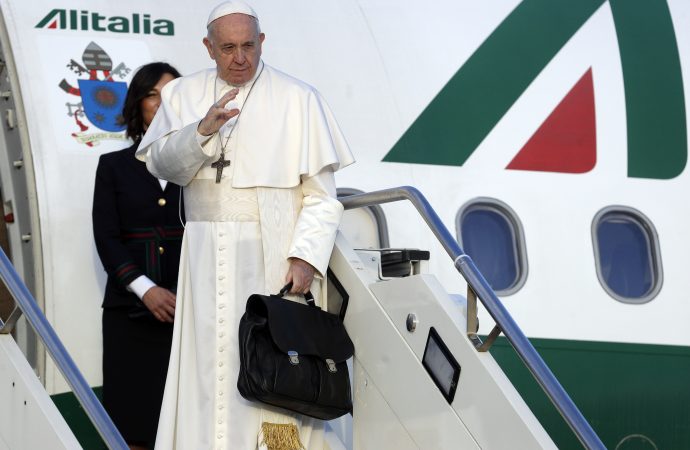In his opening act Sunday on a two-day visit to Bulgaria, Pope Francis praised the nation as a bridge not only among the various religious communities present within its territory, but also on the European continent, serving as a gateway for migrants crossing Turkey and seeking to enter Europe.
“Your country has always distinguished itself as a bridge between East and West, capable of favoring encounter between the different cultures, ethnic groups, civilizations and religions that for centuries have lived here in peace,” the pope said in Sofia May 5.
Speaking to authorities and the diplomatic corps in Sofia’s Piazza Atanas Burov, he noted how at this moment in history, some 30 years after the fall of communism in the nation, Bulgaria is faced with the impact of some two million citizens emigrating in recent decades “in search of new opportunities for employment.”
“At the same time, Bulgaria - like so many other countries of Europe - must deal with what can only be called a new winter: the demographic winter that has descended like a curtain of ice on a large part of Europe, the consequence of a diminished confidence in the future,” he said.
Francis noted how a fall in the birth rate combined with an intense flow of emigration has led to the depopulation and abandonment of many villages and cities in Bulgaria. In northern Bulgaria in particular, the poorest area in all of Europe, some “ghost villages” have as few as four residents.
Collectivization in Bulgaria in the 1950s created a boom of farms and jobs in the area, however, following the push for land privatization in the 1980s and increasing urbanization of cities, most people have moved, leaving the farms and jobs in sharp decline. A local mayor in at least one village recently told Euronews that the disappearance of the settlements and jobs in the area made her people “nostolgic for communism.”
At the same time, Francis noted that Bulgaria is also faced with a high number of migrants, mostly Syrian and Afghan migrants fleeing war and poverty, who seek to cross their borders in an effort to reach wealthier parts of Europe in hopes of finding “new opportunities in life or simply a safe refuge.”
Francis’s positive mention of migrants is topical following his private meeting with Bulgarian Prime Minister Boyko Borisov, whose center-right coalition government includes three nationalist, anti-migrant parties. The government has called for the closure of EU borders to migrants and sealed off its own frontier to Turkey with a barbed-wire fence.
The pope also greeted the different religious communities, including the Bulgarian Orthodox Patriarch Neophyte and Orthodox faithful, Catholics and members of the Jewish and Islamic communities.
Praising Bulgarian hospitality, the pope said every religion is called “to foster harmony and concord,” and he urged members of different religious communities to take advantage of this hospitality in a bid to encourage “a culture and an environment of complete respect for the human person and his or her dignity, by establishing vital links between different civilizations, sensibilities and traditions, and by rejecting every form of violence and coercion.”
“In this way, those who seek by any means to manipulate and exploit religion will be defeated,” he said, and pointed to saints with roots in Bulgaria who promoted unity, such as Pope John XXIII and Saints Cyril and Methodius, two brothers who are highly revered in both Catholic and Orthodox traditions for evangelizing the Slavic world.
St. John XXIII, who for ten years served as the Vatican’s delegate to Bulgaria, “never ceased to feel deep gratitude and esteem for your nation,” and at one point in a homily said that “wherever he would go, his house would always be open to everyone, Catholic or Orthodox alike, who came as a brother or sister from Bulgaria,” Francis said.
Francis praised his predecessor for working tirelessly “to promote fraternal cooperation between all Christians,” above all in his calling of the 1962-65 Second Vatican Council, which prioritized ecumenical relations.
Shortly after the close of the council, in 1968, an official delegation composed of top civil and ecclesial authorities in Bulgaria have made an annual visit to the Vatican on the feast of Saints Cyril and Methodius, celebrated by Catholics Feb. 14 and by Orthodox May 11.
“These two Saints evangelized the Slavic peoples and were at the origin of the development of their language, their culture, and above all their abundant and enduring fruits of Christian witness and of holiness,” the pope said.
“Blessed be Saints Cyril and Methodius, co-patrons of Europe! By their prayers, their genius and their joint apostolic efforts, they serve as an example for us and they continue to be, more than a millennium later, an inspiration for fruitful dialogue, harmony and fraternal encounter between Churches, States and peoples,” he said, praying that their “radiant example raise up many followers in our own day and open up new paths of peace and concord!”
He urged the nation’s leaders to continue encouraging young people to stay, rather than emigrate, but offered a “respectful suggestion” to Bulgarians not to “close your eyes, your hearts or your hands - in accordance with your best tradition - to those who knock at your door.” The reference is to a Bulgarian Christmas tradition in which the door of one’s home is opened to anyone who knocks, in commemoration of the Holy Family searching for a place to stay the night of Jesus’ birth.
Francis closed his speech praying that Bulgaria, situated between the Danube River and the Black Sea and “rendered fruitful by the humble labor of so many generations, open to cultural and commercial exchanges, integrated in the European Union, and with solid links to Russia and Turkey,” will be able to offer “a future of hope” to all of its citizens.

